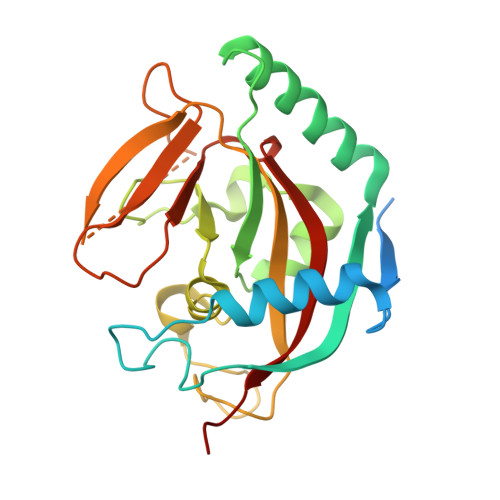Family-wide chemical profiling and structural analysis of PARP and tankyrase inhibitors
Wahlberg, E., Karlberg, T., Kouznetsova, E., Markova, N., Macchiarulo, A., Thorsell, A.G., Pol, E., Frostell, A., Ekblad, T., Kull, B., Robertson, G.M., Pellicciari, R., Schuler, H., Weigelt, J.(2012) Nat Biotechnol 30: 283-288
- PubMed: 22343925
- DOI: https://doi.org/10.1038/nbt.2121
- Primary Citation of Related Structures:
3GOY, 3MHJ, 3MHK, 3P0N, 3P0P, 3P0Q, 3SE2, 3SMI, 3SMJ - PubMed Abstract:
Inhibitors of poly-ADP-ribose polymerase (PARP) family proteins are currently in clinical trials as cancer therapeutics, yet the specificity of many of these compounds is unknown. Here we evaluated a series of 185 small-molecule inhibitors, including research reagents and compounds being tested clinically, for the ability to bind to the catalytic domains of 13 of the 17 human PARP family members including the tankyrases, TNKS1 and TNKS2. Many of the best-known inhibitors, including TIQ-A, 6(5H)-phenanthridinone, olaparib, ABT-888 and rucaparib, bound to several PARP family members, suggesting that these molecules lack specificity and have promiscuous inhibitory activity. We also determined X-ray crystal structures for five TNKS2 ligand complexes and four PARP14 ligand complexes. In addition to showing that the majority of PARP inhibitors bind multiple targets, these results provide insight into the design of new inhibitors.
Organizational Affiliation:
Structural Genomics Consortium, Karolinska Institutet, Department of Medical Biochemistry and Biophysics, Stockholm, Sweden.


















